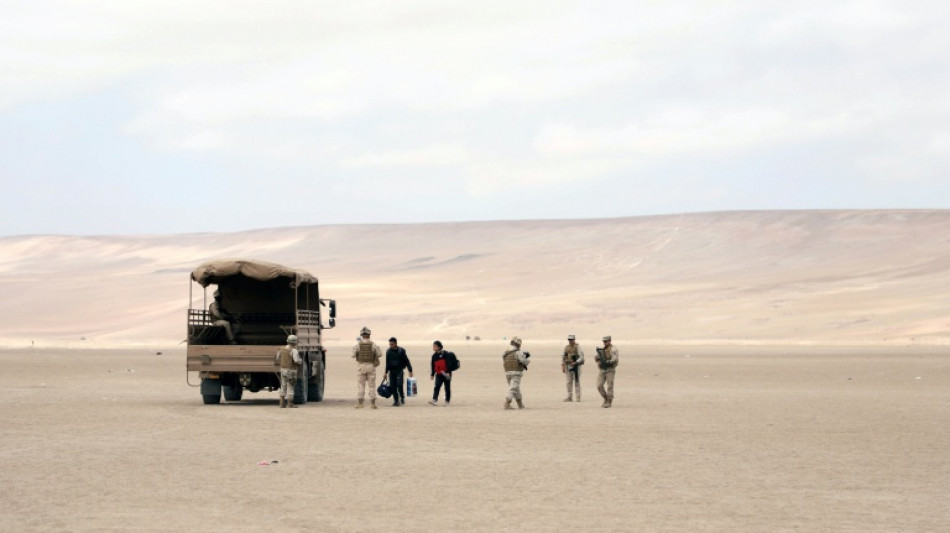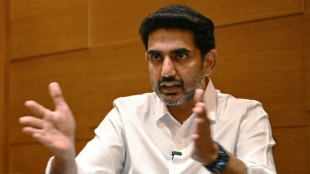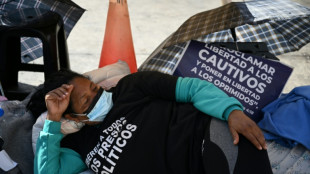

Migrants brace for hostile climate after Chile's election
After a 15-day overland journey during which she feared a heart attack from the high altitude, Venezuelan hairdresser Giovaneska Escobar finally reached Chile, the country where she hoped to rebuild her life with her two young children.
Four years later, the 37-year-old says she feels threatened again.
Unable to get her papers to live legally in Chile, she faces a political climate increasingly hostile to migrants like her.
Whoever wins the November 16 presidential election is expected to tighten measures against undocumented foreigners.
Security has become voters' top concern, according to opinion polls. And a majority of Chileans link rising crime to irregular migration.
The issues dominate the campaign, which has thrown up a range of extreme proposals -- from mass expulsions, to building a border wall, to laying mines along the frontier.
"I know many Venezuelans came here and harmed the country," Escobar told AFP. "But others came to work, to make a living. I hope those running for president can give us a chance."
The race to succeed leftist President Gabriel Boric pits Communist candidate Jeannette Jara against far-right hopeful Jose Antonio Kast.
Right-wing contenders Evelyn Matthei and Franco Parisi are also among the frontrunners.
- The long march -
Some 337,000 foreigners – mostly Venezuelans – are in an irregular situation in Chile, according to official figures.
Many work in the informal economy as delivery riders, security guards or farm laborers.
Escobar left Venezuela with her two children, crossing Colombia before entering Chile on foot via the Bolivian border.
In the harsh Andean highlands, she feared she might die from respiratory failure.
Last year, prosecutors reported 12 deaths linked to altitude sickness. So far this year, there have been eight.
"It was a very hard journey, an adventure I would never repeat," she said.
Now, Escobar lives in a downtown Santiago apartment building where she cuts hair.
She can still access healthcare and enroll her children in public schools. There are no immigration raids.
- From mines to biometrics -
But regardless of who wins the election, undocumented migrants face the prospect of deportation under the next government.
Kast has the most hardline plan, including a border wall and mass family deportations.
"I want to tell those in Chile without legal status to start thinking about their future, because there will be no mass regularizations," he said.
Parisi proposes mining the Bolivian border.
Even on the left, tougher measures are on the table.
Jara, the center-left candidate allied with the government, wants biometric registration of undocumented migrants and the expulsion of those who refuse to comply.
Unlike Kast and Matthei, she does not seek to criminalize irregular migration.
Katriela Yepez, a 22-year-old Venezuelan student, arrived seven years ago and has legal status.
But she worries about her relatives who came more recently. "My fear is that they will be deported," she said.
-'Everything comes through'-
Most irregular entries occur along the Bolivian border, near the small Atacama desert town of Colchane, 24 hours drive north of Santiago.
"Contraband comes through, everything comes through; there is no control. No measure has worked," local councillor Maribel Mamani told AFP by phone.
The migration wave has fueled insecurity and driven many Colchane residents away. Of the 2,000 inhabitants in 2020, only about 1,200 remain, Mamani said.
President Boric has deployed troops to reinforce border controls.
Official data shows the number of unauthorized crossings has dropped to 29,269 a year.
For those already in Chile, their hope is to work and to live free of fear.
"We want to be given the opportunity to be here, to be able to be legal. We don't want to run anymore, we don't want to be afraid," said Escobar.
M.Sullivanv--NG



